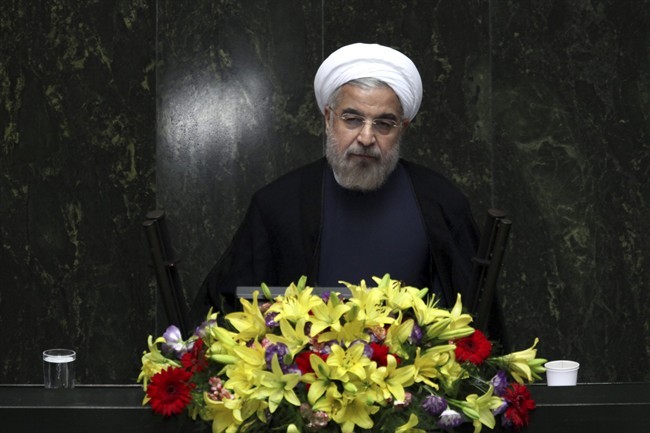U.S. plans to launch a strike on Syria have been watched closely by one of the Arab Republic’s closest allies — Iran.

It’s no secret that the Iranian government has provided assistance and military aid to the regime of President Bashar Assad and Iran’s supreme leader has not been shy about voicing his opposition to a military strike.
In recent weeks Ayatollah Khamenei has been quoted as saying Americans would “pay a price” should President Barack Obama move forward with an attack on Syrian government targets.
Splashed across the CNN homepage on Friday was the headline, “Iranian leader: U.S. will ‘definitely suffer’ if it leads strike on Syria.”
And then there’s Fox News asking “Is Iran planning revenge strikes if US hits Syria.”
To view our full coverage of the crisis in Syria, click here
But mixed in with the rhetoric and allegations is a much more moderate tone coming from newly-elected President Hassan Rouhani.
According to an article in the Los Angeles Times, Rouhani may not have intentions to give additional support to Assad if a U.S. attack happens.
Rouhani condemned the use of chemical weapons, pointing out Iran was the victim of a chemical attacks by Iraq in the 1980s, but did not point fingers at one side of the conflict or the other.
“The Islamic republic of Iran… asks the international community to do everything to stop the use of these weapons anywhere in the world,” he said on Aug. 24 — three days after the attacks on Damascus suburbs, where more than 1,400 people died.
The Washington Post has reported Rouhani gave a speech to Iran’s Assembly of Experts that said, “If something happens to the Syrian people, the Islamic Republic of Iran will do its religious and humanitarian duties to send them food and medicine.”
Rouhani also announced this week Iran will allow its Foreign Ministry to take responsibility for nuclear talks set to begin again at the end of this month.
The Los Angeles Times quoted analyst Saeed Laylaz as saying it was “a U-turn in Iranian diplomacy.”
Dr. Abbas Milani, director of Iranian Studies at Stanford University, said Rouhani appears to be acting in the best interests of the county.
But the Syria crisis has put him in a tricky position, as he has to try to appease hardliners, moderates and the international community.
“Those that have some predisposition… They have taken some slice of the reality in Iran and blown it out of proportion,” Milani said.
But it’s not just Rouhani that is changing the view of how Iran is dealing with the Syrian conflict.
Former President Akbar Hashemi Rafsanjani reportedly said Assad was behind the chemical attacks.
“The people have been the target of a chemical attack by their own government and now they must also wait for an attack by foreigners,” he reportedly said.
The Foreign Ministry later dismissed those comments, saying they were “distorted” and that he actually said, “”On the one hand the people of Syria are the target of a chemical attack, and now they must wait for an attack by foreigners.”
But according to The Washington Post, Foreign Minister Mohammad Javad Zarif said the Assad regime had “made grave mistakes that have, unfortunately paved the way for the situation in the country to be abused.”
Even the Ayatollah’s words about the U.S. “suffering” weren’t necessarily as threatening as it was made out to be.
His comment, made to the Assembly of Experts, was “The United States is wrong about Syria, and it is certain they will suffer… just like in Iraq and Afghanistan.”
Khamenei did, however, threaten to “annihilate” the Israeli cities of Tel Aviv and Haifa back in March, after Israel warned it was mulling military action against Iran over its nuclear program. There were also threats against Israel as recently as last month, when a Iranian security official said, “If the U.S. fires a missile into Syria, it will receive its response in Tel Aviv.”
Iran has lobbed plenty of threats at Israel, particularly in the eight years before Rouhani took office.
His predecessor, Mahmoud Ahmadinejad, was never shy about criticizing and trying to intimidate Israel. He also took part in a 2006 conference questioning the Holocaust and not only said the genocide of six million Jews was a “myth,” he said Israel would be “wiped off the map.”
This week, Rouhani reportedly wished a “Happy Rosh Hashana” to the Jews of Iran and the world on an English-language Twitter account.
But, much like Rafsanjani’s reported chemical weapons comment, an official denied it was Rouhani who tweeted the well wishes, rather his followers.
Foreign Minister Zarif had a Rosh Hashana tweet of his own, which he admitted came from him directly.
He also distanced Iran from Ahmadinejad’s Holocaust denial, in an exchange with Christine Pelosi — the daughter of U.S. House of Representatives Minority Leader Nancy Pelosi.
Milani said it was “a gesture of humanitarian solidarity,” instead of having a government “spouting anti-Semitic bile.”
*With files from The Associated Press, Reuters and other agencies




Comments